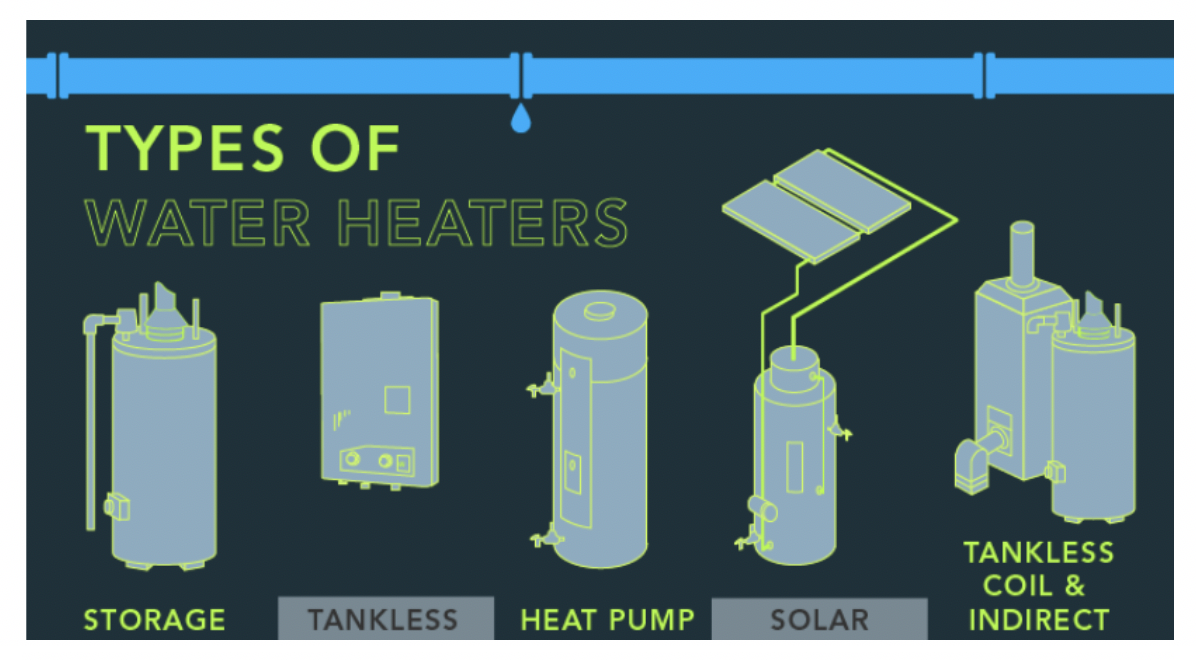High-Efficiency Water Heaters
New ResidentialWhat are High-Efficiency Water Heaters?
High-efficiency water heaters provide an energy-efficient method of supplying domestic hot water. Figure 1 shows several different types of water heaters, including storage, tankless, heat pump, solar, and tankless coil, and indirect water heaters.
Conventional, storage water heaters hold hot water in a tank, while tankless water heaters only heat the water upon demand. Heat pump water heaters use electricity to transport heat from one source to another (e.g., air-source heat pumps, geothermal heat pumps) instead of providing heat for hot water directly (see Geothermal Heat Pumps).[1] Solar water heaters utilize the sun’s heat and tankless coil, and indirect water heaters use a building’s heating system to provide domestic hot water (see Solar Thermal Systems).
Typical energy sources for high-efficiency water heaters include natural gas, propane, electricity, and solar. The availability and cost of any of these sources or combinations of these sources can dictate equipment and system selection along with other selection criteria including the home’s hot water requirements such as usage times, amount of water use, temperature range, and flow rates.

Figure 1. Types of water heaters. (Source: US DOE Energy Saver 101: Water Heaters)
How to Incorporate a High-Efficiency Water Heater
Selecting a high-efficiency water heater is part of a whole home water conservation strategy to reduce indoor water consumption by specifying water-efficient fixtures, equipment, and systems (see Indoor Water Conservation). Work with experienced and knowledgeable residential water heater professionals to navigate the marketplace of available high-efficiency water heaters to find the best water heater model to supply hot water reliably, while saving energy and costs.
The NJ Office of Clean Energy offers the following recommendations for purchasing and installing a water heater for your home.[2]
- Choose a properly-sized tank or equipment capacity to meet your household’s hot water needs.
- Install your new system in an easy to access and maintain location.
- Properly vent and insulate at least the first 15 feet of your hot water pipes.
- Understand the maintenance requirements of your water heater and have your installer show you how to perform basic maintenance tasks.
The US Department of Energy’s Energy Saver 101: Water Heating infographic provides additional information about the different types of water heaters and advice on selecting the right model for your home. Before purchasing a water heater, consult Energy Star’s list of qualified products and check the New Jersey Office of Clean Energy for rebate requirements, including the minimum Uniform Energy Factor (UEF), which measures the energy efficiency of the water heater.
Benefits
High-efficiency water heaters use less energy than a standard water heater, primarily by taking less time to heat water, which in turn translates to fewer carbon emissions and lower utility bills.
Costs
High-efficiency water heaters have higher upfront costs than standard water heaters but provide long-term cost savings through reduced energy costs. If different fuel options are available in your area, contact your local utility to compare fuel costs and rates as average cost savings depend largely on energy costs.[3]
Resiliency
High-efficiency water heaters contribute to resiliency by decreasing energy consumption, including peak loads, which decreases reliance and stress on fuel sources and energy infrastructure.
[1] US DOE. 2018. Heat Pump Water Heaters. https://new.usgbc.org/leed-v41#bdc (accessed January 24, 2019).
[2] New Jersey’s Clean Energy Program. 2018. WARMAdvantage Rebates http://www.njcleanenergy.com/residential/programs/warmadvantage (accessed January 23, 2019).
[3] US DOE. 2018. Selecting a New Water Heater. https://www.energy.gov/energysaver/water-heating/selecting-new-water-heater (accessed January 23, 2019).
